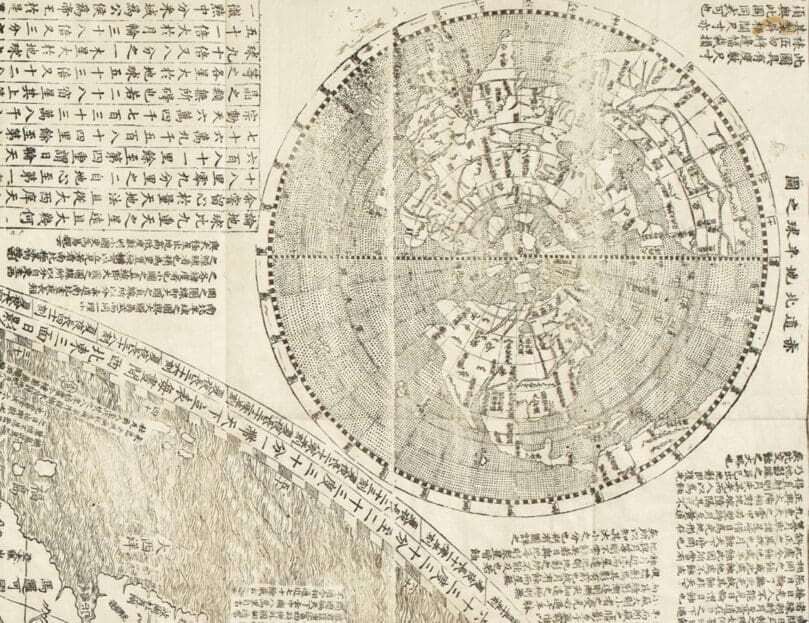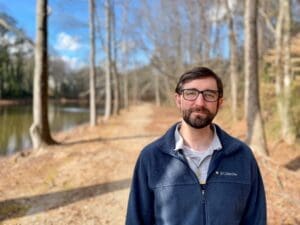 CNS photo/courtesy of the Vatican
CNS photo/courtesy of the VaticanAtlanta
We can walk with trustworthy guides
By ALEXANDER BROWN, Special to the Bulletin | Published December 9, 2022
After coins and rock collecting—the subjects of my first two reflections—my last childhood interest I have reflected on in my later years is that of maps. That’s right, the simple charts that show where things are in relation to another. Ever since grade school, when I had to complete timed, standardized tests that included map reading skills, I have been intrigued by these items of human ingenuity and invention.
I didn’t enjoy the map questions as much as the ones on arithmetic and grammar (nerd alert), but I did see their value. The fact that we humans can think outside of ourselves and use spatial reasoning to get from one place to another effectively and efficiently always impressed me. Nowadays, I sometimes look at a map but like most 21st century Westerners rely on the advanced GPS features of my smart device. Some people, like my sister, have an incredible knack for remembering complex sets of directions to and from a place. In my case, however, I need to constantly refer to the directions or street plan.

Alex Brown
This is a hugely useful set of tools and skills and can rightly direct our lives in many ways. One may say “I don’t need a map; I can figure it out on my own.” But even in spontaneously exploring a new place, you are building your own map of the tangible locations while seeing which places you like, which you don’t and which you should definitely visit or absolutely avoid.
Consider someone telling you about that amazing hole-in-the-wall restaurant with the incredible dessert. Then, think of the dangerous alligator infested water you thought about swimming in or a part of town too close to the recent pollution spill. Knowing about these places ahead of time can greatly improve your chances of getting the most out of your visit to a place and shield you from any dangers that may be present. It is with these two guides, internal and external, that we can best experience all that is available.
Divine maps
In earlier reflections, I talked about our relationship with the uncreated Creator, causing us to turn from sin and be healed by the saving love and grace of Christ. One of the most amazing aspects of this relationship is the gift of two divinely inspired “maps” that have been drawn for us in our lives. Just like a physical map and a good sense of direction, these maps don’t limit our free will but actually bring us true freedom as they show us the way we should go and the bounds we need to stay within.
The first is what in philosophy and theology we call the “natural law”—the way each of us as human beings should conduct our lives, no matter where we live, which culture we are from, and what individual preferences or beliefs we have. Now for sure, there are individual preferences and particular cultural practices that make us unique and add to the wonderful diversity we share in the human family. But there are universal truths which hold us together that we need to stand up for especially in the face of greed, hatred, lust and pride.
Where do we find the first map? The Scriptures tell us that God wrote this law—the natural law—on our hearts. According to St. Paul, we “show that the demands of the law are written in (our) hearts, while (our) conscience also bears witness and (our) conflicting thoughts accuse or even defend (us).” (Rom 2:15) So we have a natural sense of right and wrong that we can “discern by reason” and our consciences tell us when we do harm to ourselves or another (Catechism of the Catholic Church, paragraph 1953). This is saying that the law is written into our very nature as God designed us. But, what do we do when things are not as clear or we aren’t quite sure how to act?
I know there have been times where I tried to rationalize what I knew was clearly not good for me or others. The fullness of the Gospel tells us that Christ wanted to walk by our side in relationship, and that he gave us a very special set of gifts to help us on our path. Like a light revealing our way through a dark room, the natural law and the rest of Jesus’ gifts make for an easier path and less chance of injury and destruction. We can stumble around to find our way through life—and the Lord knows I have tried. But Jesus, “the way, the truth and the life,” invites us to use our properly guided free will to obtain true freedom and reject the harmful effects of sin.
“What is truth?” Pilate famously asks, and our culture often parrots. With all the different opinions, sayings and arguments, it can be hard to know which ones we should follow. This is where the second map comes in handy—the living teaching office of the Catholic Church.
A map or guide from an expert or trustworthy friend can point to the truth that calls us all. Yet we long for something beyond ourselves, a divinely protected way to know how we should live. If it is up to us mere humans, then we will quickly go astray (a look at any history book or newspaper will give us plenty of evidence of this). Instead, we can know from history and reason that Jesus founded a church and promised something very special—that on the important stuff, what we should have faith in and the way we should behave—there would not be any mistakes in what is objectively best for us.
Discovering the life-saving map of the natural law together with the infallibility of Christ’s church was a major turning point in my life. About 10 years ago I had a profound experience learning the meaning behind why the Catholic Church teaches what she does. Specifically, it was in the realm of sexual ethics and the fundamental truth of the human person.
I and some people dear to me had serious questions about how we should live our lives, and in my quest to make up my own mind on these things, I consulted the faith I had been brought up in. What I discovered both astounded and thrilled me. Instead of a set of dry, restrictive rules, I found a wonderful, rich teaching which finally explained to me why I should live in a particular way so as to gain true freedom, self-mastery and joy. I was amazed to realize that Jesus, the second divine person in the Trinity and God himself, founded the church and promised that under the guidance of the pope it would never err in matters of faith and morals.
Life-giving answers
Does that mean that everything that everyone in the church says is always right? Certainly not; it is filled with sinners like me and us all. But it does have that guarantee from the Son of God to guide us lovingly and allow us to live in freedom instead of the slavery of sin if we follow the map.
The field of apologetics, specifically Christian and Catholic apologetics, has beautiful life-giving answers framed to help answer the questions we all may struggle with on a host of topics. I again extend an invitation, this time to look to the teachings of the Catholic Church with fresh eyes.
The map of the natural law interpreted through the teaching authority of the church is a treasure of immeasurable value. It speaks to our deepest longings and gives clarity in a distraught and confusing world. Now, if you fear becoming a thoughtless, rule-following robot, I call your attention to a crucial detail. The map is not the end in itself, but the way to the destination. Jesus tells us this constantly when talking to the Pharisees who were scrupulous sticklers for the rules. No, Christ wants us to live in fulfillment of the law–to follow the universal Golden Rule to love one another as he has loved us. If we live too rigidly by the map for the sake of the map itself, we miss out on the loving relationship with our Creator, Redeemer and Sanctifier as well as the people we are walking with.
There has been no better time in human history to quickly find a plethora of resources that answer these questions. I did, and my life has forever been changed for the better. Is following the maps of the natural law and what the Catholic Church teaches difficult at times? Absolutely–but no great thing is easy. And in a world that so often is confusing and frustrating, it is surprisingly simple and wonderfully liberating.
I have enjoyed sharing these three reflections with you and thank you very much for reading them. If given the opportunity, I may continue to share why my relationship with God, in the person of Jesus Christ, shared by the church he founded is a well-spring of inestimable value for me. I pray, no matter where you are on this journey, my humble words help you live more fully and to find lasting joy and peace in God’s friendship.
Alex Brown teaches high school Spanish and computer science at St. Mary’s Academy, Fayetteville.